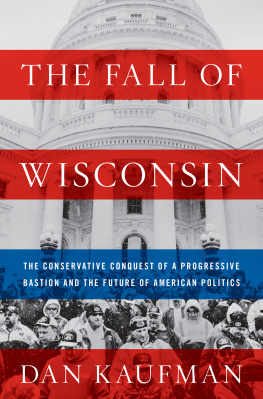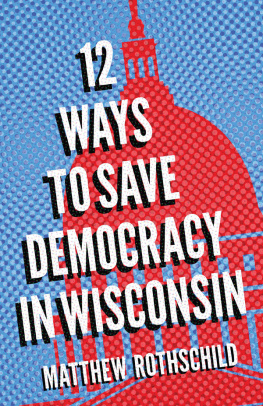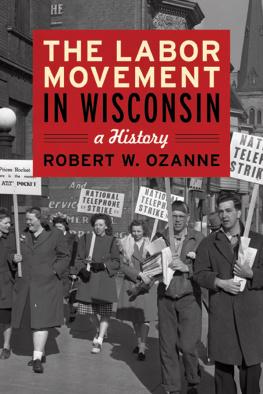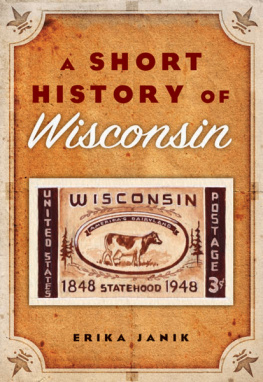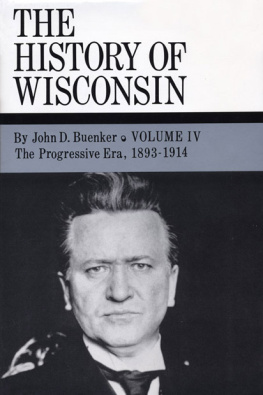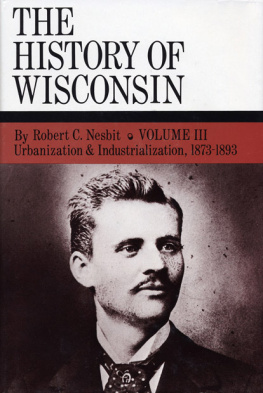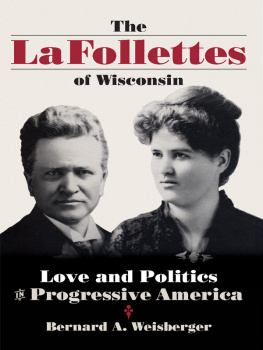
THE FALL OF
WISCONSIN
THE FALL OF
WISCONSIN
THE CONSERVATIVE CONQUEST OF A PROGRESSIVE
BASTION AND THE FUTURE OF AMERICAN POLITICS
DAN KAUFMAN

W. W. NORTON & COMPANY
Independent Publishers Since 1923
New York | London
Copyright 2018 by Dan Kaufman
All rights reserved
First Edition
Portions of this work appeared, in different forms, in the New York Times
and on the website of The New Yorker.
For information about permission to reproduce selections from this book, write to
Permissions, W. W. Norton & Company, Inc., 500 Fifth Avenue, New York, NY 10110
For information about special discounts for bulk purchases, please contact
W. W. Norton Special Sales at specialsales@wwnorton.com or 800-233-4830
Book design by Chris Welch Design
Production manager: Julia Druskin
JACKET DESIGN BY FORT
JACKET PHOTOGRAPH PHILIP MONTGOMERY
ISBN 978-0-393-63520-1
ISBN 978-0-393-63521-8 (e-book)
W. W. Norton & Company, Inc., 500 Fifth Avenue, New York, N.Y. 10110
www.wwnorton.com
W. W. Norton & Company Ltd., 15 Carlisle Street, London W1D 3BS
For Juliette and Luca
And to the memory of my parents, Jerry and Judy
The question will arise and arise in your day, though
perhaps not fully in mine, which shall rulewealth or
man; which shall leadmoney or intellect; who shall fill
public stationseducated and patriotic freemen, or the
feudal serfs of corporate capital?
EDWARD G. RYAN, CHIEF JUSTICE OF WISCONSIN, 1873
CONTENTS
H illary Clinton was confident about winning Wisconsin. Throughout the lead-up to the 2016 election, she had never trailed Donald Trump in a single poll, and Wisconsin had not gone for a Republican presidential candidate since 1984, when Ronald Reagan swept every state except Minnesota. Her confidence was reflected by not going thereeven onceduring the campaign. Pundits echoed Clintons surety. Wisconsin looks like a blue wall there for Hillary Clinton? a Milwaukee news anchor asked NBCs Chuck Todd three days before the vote. It does, Todd replied. Or as Rachel Maddow said a few months earlier on MSNBC: The Republican Party really, really, really wants Wisconsin to be a swing statenot true. She went on: Even as Republican presidential candidates lose there year after year after yearI mean even Michael Dukakis won Wisconsin, right?Republicans still have kept their hopes alive that Wisconsin could be theirs. If you looked at recent presidential elections, there was little reason to doubt the end result. In 2008, Barack Obama trounced John McCain in Wisconsin by fourteen points; four years later, he beat Mitt Romney comfortably by seven.
Some of Clintons supporters were planning to gather on election night at a Marriott in Middleton, a Madison suburb, for a joint victory party with the Democratic Senate candidate Russ Feingold. Feingold had held one of the states Senate seats for three terms before losing in 2010 to the Republican Ron Johnson, a wealthy political novice, in a shocking upset. In 2016, Feingold was heavily favored to win the rematch. His race tightened the week before the election, but he still led in every poll save one.
Feingolds campaign had asked Chris Taylor, a Democratic assemblywoman from Madison, to help with his press that evening. Taylor was not confident of the outcome. She had canvassed for Democrats in rural Iowa County the summer before the election and remembered the indifference, and sometimes hostility, she was greeted with. A few people slammed the door in her face. These should have been easy doors for us: A lot of them were Democrats, she said. It was worrisome.
Early on Election Day, Taylor, who was also on the ballot, took her two boys, Sam and Ben, to a busy intersection on Madisons Near East Side. The three of them wore Chris Taylor for Assembly T-shirts and held signs, waving at the cars honking their support. It was a clear and bright autumn day with a brisk wind blowing off Lake Monona a block away. Dozens of people had shown up to join Taylor and her kids. Someone brought doughnuts and hot chocolate for the volunteers, and the gathering turned festive. Taylor, though nervous, believed Clinton would pull it out.
In the afternoon, Taylor drove to the hotel for her press shift. Around seven, an hour before the polls closed, Feingolds staff began receiving unsettling reports of low turnout in Milwaukee, a Democratic stronghold. By nine oclock, Feingolds prospects looked grim, and Clintons chances in Florida and Pennsylvania were slipping away. People were looking to me for reassurance, Taylor said. They came up to me, crying: Oh my God, Chris. What are we going to do? Outwardly, Taylor maintained her calm, but she too started to worry that Clinton would lose Wisconsin.
Taylor tried to comfort people, telling them not to give up hope, that returns from heavily Democratic Dane County, which includes Madison, were still coming in. But the states rural areas, including some of the towns and villages Taylor had canvassed, delivered strongly for Trump. Soon Taylor began panicking. Around ten, Feingold emerged into a large ballroom ashen-faced and visibly shaken. Something is happening in this country tonight, he told his supporters in a brief concession speech. I dont understand it completely. I dont think anybody does. People in the room started breaking down, crying.
Taylor left after Feingolds speech. She could no longer face the press. I had been spinning Feingold was going to win, she said. I just couldnt deal with it anymore. I ran to my car and called my husband. He and I just cried on the phone together. Taylor drove home and watched the returns in her living room. She saw Trump win Pennsylvania and Republicans make gains in both houses of the Wisconsin State Legislature. Democrats held on to a mere thirty-five of ninety-nine state assembly seats; in 2009, after Obamas election, they had fifty-two.
Around one in the morning, Taylor straggled to bed knowing Trump would win Wisconsin. A half hour later, the networks called it, awarding Trump Wisconsins ten electoral college votes, which pushed him past the 270-vote threshold needed to win the White House. Wisconsin had just made Donald Trump president. Wisconsin! Wisconsin. Wisconsin was barely in play! Megyn Kelly said on Fox News. On CNN, Jake Tapper called the result stunning.
Before she fell asleep, Taylor recalled a meeting she had with Democratic colleagues in the assembly months before the election. One of them assured Taylor that with Trump on the ticket, it would be a wave year for the states Democrats. I remember thinking to myself: You idiot! Republicans have a network, they have an infrastructure. We dont. We might pick up a seat or two here and there, but until we have an infrastructure as strong as theirs, were going to lose, she said. Few people in the country are aware of the mightiness of their network, but he should have known.
DONALD TRUMPS VICTORY may have shocked the Clinton campaign and media pundits, but the result merely heralded the final stage of Wisconsins dramatic transformation from a pioneering beacon of progressive, democratic politics to the embodiment of that legacys national unraveling. Powerful conservative donors and organizations across the country had Wisconsin in their sights years before the 2016 presidential election, helping Governor Scott Walker and his allies systematically change the states political culture.
Wisconsins history made it an especially attractive and important target. In the early twentieth century, native icons like the populist senator and governor Robert La Follette, who was known as Fighting Bob, and movements like Milwaukees pragmatic sewer socialism forged a progressive tradition that withstood the most calamitous events of the twentieth century. La Follette instituted numerous reformsdirect primaries, a ban on corporate donations to political candidates, civil-service protectionsto encourage citizen participation in government and help establish Wisconsin as a bastion of democratic ideals. Democracy is a life, and involves continual struggle, he wrote in his autobiography. It is only as those of every generation who love democracy resist with all their might encroachments of its enemies that the ideals of representative government can even be nearly approximated.
Next page
